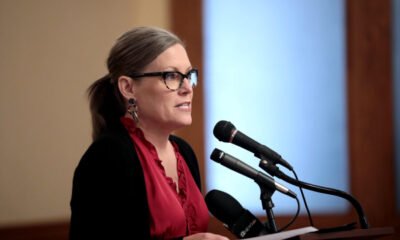Business
Under Trump, Social Security Revives Controversial ‘Clawback Cruelty’

A significant change in the Social Security Administration’s policy has stirred controversy after the agency announced it would revert to fully withholding payments from beneficiaries deemed overpaid. This new directive, effective March 27, comes after a year-long experiment aimed at lessening the financial impact of recovery efforts on recipients.
Last year, under the leadership of Martin O’Malley, the agency had begun a new approach to overpayments, significantly reducing the amount withheld to just 10% of monthly benefits. O’Malley referred to the previous practice of complete withholding as “clawback cruelty,” highlighting the hardship it imposed on vulnerable citizens. Advocates welcomed this change, which allowed many to manage their day-to-day expenses more comfortably.
The recent reversal, carried out under the Trump administration by acting Commissioner Lee Dudek, aims to enhance fiscal responsibility. The agency claims this will yield approximately $7 billion in savings over the next decade. Dudek stressed the necessity of safeguarding taxpayer funds by revisiting policies that date back to previous administrations.
However, advocates have swiftly condemned this decision, arguing that it will exacerbate hardship for the thousands who rely on these benefits. “The results are predictable: more unnecessary suffering,” said Kathleen Romig, a former SSA staffer. Kate Lang from Justice in Aging echoed these sentiments, emphasizing the impact on the most vulnerable populations, many of whom may struggle to afford basic necessities like food and housing.
An earlier investigation by KFF Health News and Cox Media Group had already spotlighted the alarming frequency of overpayments and the subsequent recovery efforts that often left beneficiaries in dire situations. In one instance, Denise Woods faced eviction after the Social Security Administration demanded she repay nearly $58,000 while contending with health issues.
The agency continues to grapple with systemic issues, including outdated technology and a workforce that has declined significantly to around 50,000 employees. Long wait times for benefits determinations and customer service are anticipated to worsen. “The risk of totally shutting down the agency is greatly increased by people mucking around that don’t know what they’re doing,” stated O’Malley, warning of potential operational failures.
This policy adjustment comes at a time of broader changes within the SSA, including substantial staff reductions aimed at improving efficiency. Critics argue that these cuts will lead to even more errors and overpayments, further complicating the lives of those affected. Jen Burdick from Community Legal Services of Philadelphia noted the impending challenges this creates in resolving payment issues.
Beneficiaries who receive notices about overpayments have options; they can appeal or request a lower withholding rate. The SSA has assured that they will not pursue recoveries while these requests are pending. Despite the shift in policies, O’Malley’s previous changes remain intact, streamlining the process for waiving overpayments in specific cases.
The decision to restore full withholding has drawn bipartisan concern, as lawmakers raise alarms over potential widespread suffering among the recipients. Advocates and former officials alike fear that this policy represents a step backward for the Social Security Administration and the millions who depend on it.


















